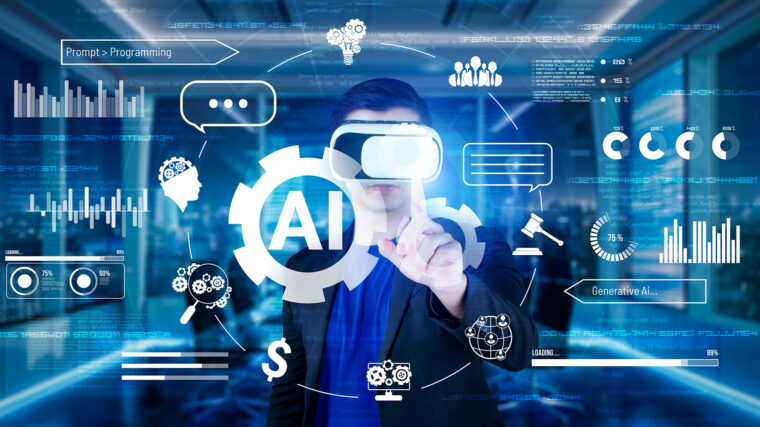Introduction
In the rapidly evolving business world of project management, integrating Artificial Intelligence has emerged as an important force driving efficiency and innovation. Traditional project management methodologies, often dependent on outdated tools such as spreadsheets and manual processes, have struggled to keep pace with the complexities of modern projects. According to a recent report by the Harvard Business Review (2023), only 35% of projects are completed, highlighting a significant gap in project success rates. This article explores the transformative potential of AI in project management, identifies existing research gaps, and poses critical research questions that guide the exploration of this dynamic field . The article is based on a Master’s Thesis report written by students Ghimire Sitaram and Sagri Gulam, supervised by Senior Lecturer Thomas Vikström. Permanent link to the report: https://urn.fi/URN:NBN:fi:amk-2024082824458.
Research Gaps
Despite the growing interest in AI applications within project management, there remains a notable gap in comprehensive research that addresses the specific impacts of AI on various project management knowledge areas. While some studies have touched on AI integration, they often lack depth in exploring how AI can enhance areas like integration management, scope management, and resource allocation, as identified in the “Authoritative Study on the Near Future Impact of Artificial Intelligence on Project Management Knowledge Areas” by Fridgeirsson et al. (2021). Moreover, existing literature primarily focuses on theoretical frameworks without providing empirical evidence of AI’s effectiveness in real-world project scenarios.
The barriers to AI adoption in project management are also significant. As highlighted in the thesis, the successful implementation of AI requires large historical datasets and uniform project information, which can be challenging to obtain. This gap in research underscores the need for a thorough investigation into how AI can be effectively integrated into project management practices, particularly in addressing the limitations of traditional methodologies.
Research Questions
To address the identified research gaps, this study poses several critical research questions:
- What is the potential role of Artificial Intelligence in project management in the future?
- Who will be the future Project Manager: Artificial intelligence, or Human?
These questions are a foundation for exploring the complex relationship between AI and project management, guiding the research towards actionable insights and practical applications.
Research Method
The research methodology employed in this study was qualitative, focusing on a comprehensive review of existing literature, peer theses, and empirical studies related to AI in project management. The research process involved several stages, including data collection from academic databases such as Web of Science and ResearchGate, where keywords related to AI and project management were utilized to identify relevant publications. A total of 53 resources were examined, including articles, websites, conference papers, peer theses, and books, to gather diverse perspectives on the topic.
The qualitative approach allowed for an in-depth analysis of the current state of AI in project management, facilitating the identification of key themes and trends that emerged from the literature. This method also enabled the exploration of the practical implications of AI integration, providing a holistic view of its potential impact on project management practices.
Key Results
After reviewing the study by Fridgeirsson et al. (2021), we are amazed at the following results that help to understand AI impact on Integration and Scope management.
Project Integration Management: The results from Fridgeirsson et al. (2021, pp.8-9) indicate that 49% of participants anticipate that AI will significantly impact the supervision and regulation of project tasks. It was also believed that AI would greatly impact the creation of a project management plan, project charter development, and integrated change control. It was thought that AI had the smallest impact on overseeing project knowledge, completing a project or phase, and leading and overseeing project tasks. The primary outcomes of the project integration management processes are depicted in Figure 1.

Project Scope Management: The results from Fridgeirsson et al. (2021, pp.8-9) indicate that AI is expected to have the most significant impact on the development of a work breakdown structure (WBS). 50 % responded that the effect was high or very high that impact on their industry in the next five years. 40% of respondents believed that AI would have a significant influence on their sector within the coming five years. Similarly, AI is expected to have less impact on defining scope (35%), managing scope (31%), and verifying scope (27%), as shown in Figure 2.

There also several findings of this research highlight several key results regarding the role of AI in project management:
- Increased Efficiency and Automation: AI technologies have the potential to automate repetitive tasks traditionally performed by project managers, such as scheduling, resource allocation, and risk assessment. This automation not only saves time but also reduces the likelihood of human error, leading to more accurate project outcomes.
- Enhanced Decision-Making: AI can analyse vast amounts of data in real time, providing project managers with actionable insights that inform decision-making processes. By leveraging predictive analytics, AI can identify potential risks and opportunities, enabling project managers to make informed choices that enhance project success.
- Improved Collaboration and Communication: AI-powered tools facilitate better communication and collaboration among project teams. By streamlining information sharing and providing real-time updates, AI enhances team dynamics and ensures that all stakeholders are aligned with project goals.
- Future Skills for Project Managers: As AI continues to reshape the project management landscape, project managers will need to develop new skills to effectively leverage these technologies. Skills such as data analysis, AI literacy, and adaptability will be crucial for project managers to thrive in an AI-driven environment.
Conclusions
The integration of Artificial Intelligence in project management represents a significant opportunity to address the challenges faced by project managers in today’s complex business landscape. By automating routine tasks, enhancing decision-making processes, and improving collaboration, AI has the potential to transform project management practices and increase project success rates.
However, the successful implementation of AI in project management requires a concerted effort to overcome existing barriers, including the need for standardized data and a shift in organizational culture. As the research highlights, there is a pressing need for further exploration of AI’s impact on specific project management knowledge areas and the development of training programs to equip project managers with the necessary skills to navigate this evolving landscape.
In conclusion, the future of project management is ready for transformation by integrating AI technologies. By addressing the identified research gaps and focusing on the critical research questions inquired, we can pave the way for a more efficient, effective, and innovative approach to project management in the years to come. As we move forward, it is essential for project managers, organizations, and researchers to collaborate in harnessing the full potential of AI, ensuring that project management practices evolve in tandem with technological advancements.
Based on the research we expect that AI will influence project management in the future, but it is important to note that AI lacks human qualities, thus emphasizing the continued necessity for human project managers. Human abilities such as compassion, emotional intelligence, negotiations, decision-making, and resource management will be highly important in the future, possibly more so than ever before. We think that AI will support project managers instead of taking their place. The project manager can use AI tools to improve project success and efficiency.




